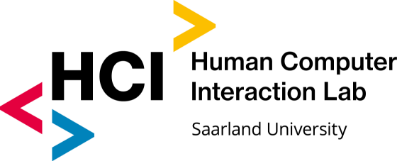Seminar: Interactive Robotics / Winter term 2020
| Type | Seminar (7CP) | |
| Time | Wednesdays (16.00-18.00) , (Kick-off, 4th of Nov ). | |
| Place | Bld. E1.7 (MMCI), Room 001 & Remote | |
| Language | English | |
| Links | LSF |
Description
In Human-Computer Interaction, robotics has been a topic of intense research, initially mostly restricted to research labs due to the difficulty of building such devices. In the past few years, the wide availability of accessible hardware platforms for prototyping (such as Arduino) and digital fabrication tools made it easier to develop interactive robotic systems. A variety of robotic devices and applications are now finding their way to end-users, and robots have the potential to enhance human performance and bring unique new opportunities for interaction with our environment and with other people. The objective of this seminar is to acquire conceptual, technical and practical skills in developing interactive robotics. We will address the unique challenges of interactive robotics on those three levels.
The seminar will cover the following topics:
- Human Augmentation. Attaching a wearable robotic device to the user’s body in order to enhance human capabilities and performance.
- Mobile Robotics. What if we all had a robot in our pocket? Now that robots can be miniaturized, how can our daily interaction benefit from a robot that is always with us?
- Robotic Everything. We are surrounded by various objects and appliances, which so far are primarily static. Endowing motion and robotic capabilities, such as automatic shape change, can lead to a new interaction with our house, environment, or IoT.
- Human-Like Devices. How do we interact with technology that is human-like and, through robotic technologies, can communicate body language? We can endow traditional devices with body language to express interaction, needs or behaviors.
- Presence: Robots can also be social companions, for instance for elderly people. There is a need to develop simple and meaningful interactions between someone with special need and a social robot.
- Physical Data Representation: It is a challenge for HCI to visualize data. Interactive robotic installations can be used to visualize and interact with tangible moving data.
Activities
This seminar combines conceptual basics and theory with a practical team project:
To make you familiar with important conceptual and technical foundations, the seminar will involve three reading activities, done individually by each student. For every reading activity, you will read one or more seminal research papers and hand in a brief written report that discusses these papers. Reports should summarise the key aspects, and more importantly, should include original and critical thought that show you have acquired a meta level understanding of the topic.
In the team project, you will work together with other students on developing your own interactive robotic system and develop interactions. In the project, you will gain practical experience with technologies for building robotic system, you will learn how to design your own innovative robotic interface, and you will gain hardware and digital fabrication experience by realizing a working solution. Creativity, ideation and experimentation will be essential aspects of the project phase. We will present a list of potential project topics during the kick-off session. Students can choose from these or propose their own ideas for projects. Our experience is that developing your own solution within a team of students can be a lot of fun and lead to impressive results; some of our past student projects have gained remarkable attention on the web and even have received awards (see for instance Interactive Jacket for Cyclists, Interactive Dancing Socks, Ambient Flower, Sprinter). We’ll help you to realize a great project.
Covid-19
Due to Covid-19 restrictions, the seminar will take place both remotely and on site. A purely remote, online participation is not possible in this course, as this seminar involves work with hardware. The plenary meetings will take place remotely. Individual group meetings will be held on-site or remotely, depending on the current project phase, the team’s preferences and the pandemic situation.
Registration
Please note that because of the close individual supervision the number of participants is limited to 10! Please register through the seminar portal offered by the computer science department
https://seminars.cs.uni-saarland.de/seminars2021 . This is a master-level seminar, which can also be taken by Bachelor students from 5th study semester and above. For the registration, we require a brief motivation statement on why you want to take this class.
Knowledge of Hardware programming is preferred. Basic knowledge in hardware programming (e.g. some experience with Arduino) will be helpful but is not a prerequisite for taking this course. In this seminar, you will build a functional tangible robotic prototype. Hence, you must be willing to use or learn digital fabrication (3D printing).
Literature and Materials
All the reading material and resources will be made available on Moodle.


